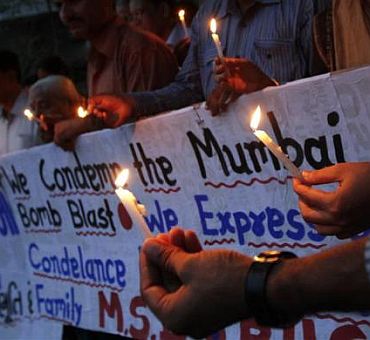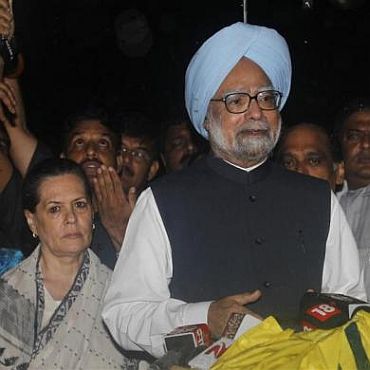
If India is not to be reduced to a Lebanon of yesteryears or another Pakistan we need to act with sense of urgency, marshalling our resources and spirits and acting with a single minded determination to eradicate the scourge of terrorism before it consumes us, says Vivek Gumaste.
The ghastly carnage inflicted by the series of strategically located and precisely coordinated explosive devices that ripped through the heart of Mumbai on July 13 underlines the fiendish cunning and relentless barbarism of the satanic forces of terror arraigned against us.
But more importantly the bomb blasts drive home a critical existential reality of present day India: our stark vulnerability; a vulnerability that is neither inevitable nor a fait accompli, but a vulnerability that is of our own making.
...

The genesis of our pathetic plight vis-a-vis terrorism lies in a debilitating mental malady; a fatal flaw in the nation's psyche which encases a persistently defective thought process that wallows in moralistic injunctions to the detriment of cognitive functioning and firm decision making.
It is this trait that hangs like an albatross round the country's neck engendering a deadly procrastination masquerading as moral restraint that is the stumbling block of our policy against terror.
The story of India's battle against terror has been one long exercise in inane restraint. We refused to respond in 1993 when 13 bombs rocked Mumbai damaging its stock exchange and the Air India building and killing 257 innocent people.

We again refused to react when these merchants of hate targeted our Parliament in an attempt to annihilate our leadership and destroy the democracy that we cherish.
And, in the waning days of the last millennium, when terrorists of the same ilk hijacked IC-814, callously murdered Rupin Katyal and humiliated the nation in no uncertain terms -- we again meekly caved in to their demands. No retaliation followed.
In 2006, seven synchronously timed bombs blew apart seven commuter trains in Mumbai killing more than 200 people and maiming several more. We again took recourse to our exemplary restraint flashing it like a badge of honour.
Finally in 2008 it appeared that the limit of our patience had been breached when 10 armed gunmen went on a rampage through Mumbai targeting strategic sites and mercilessly gunning down hundreds of civilians.

But what did we do? We riled at the top of our voices, took to the streets in violent rage and our government seethed with anger threatening to do something but did nothing tangible in the end; the masterminds roam free in Pakistan to this day.
For 20 painful years, in the face of innumerous brutal assaults each more vicious and diabolical than the prior one, we have exhibited a mute stoicism, appreciable at first but one that is looking increasingly naivete.
Restraint, the much-bandied word that crowds the lexicon of our anti-terror policy desperately calls out for clarification.
Restraint cannot not be mistaken as the end point. Nor should it be a subterfuge for apathetic resignation or a camouflage for pusillanimity.

Only when restraint evokes a positive response within a specific time frame can it be a worthwhile strategy. Persistent restraint in the face of continuing evil smacks of cowardice and not moral superiority; in addition it is counterproductive.
Emboldened by the predictable pattern of diffidence, terrorists have continued with their campaign of depravity, striking at will. Their evil message rings loud and clear: we will kill your citizens when we want, where we want and how we want and we know you will do precious little about it.
That refrain has to be changed. The time for restraint is over. It is the time for definitive action.
First and foremost we need a seismic shift in our mindset that replaces starry eyed idealism with the realism of hardpolitik concurrent with a renewed evaluation of our logistic options.
To expect the weak civilian government in Pakistan to reign in the terrorists is unrealistic and futile. By placing our faith in the Asif Ali Zardari government, we put our own credibility at stake.

Responding to India's exhortation post 26/11, Pakistan's Prime Minister Yusuf Raza Gilani remarked: "Pakistan is itself facing Mumbai-like attacks almost every other day and when we cannot protect our own citizens, how we can guarantee that there wouldn't be any more terrorist hits in India."
So if Pakistan will not or cannot act against these India centric terrorists doesn't it make good sense that we should? Easier said than done maybe the chant from cynics. But do we have any other option?
Are we going to wait patiently to be bled to death through a thousand cuts as the terrorists have threatened to do?
Setting aside this contentious option for a moment let us look at other possibilities. If international compulsions prevent us from adopting cross border tactics, can we at least shore up our internal security?

But even on that internal front we come up short. The Prevention of Terrorism Act that had proven to be partially effective despite its inherent defects was hastily rusticated in deference to partisan politics leaving a dangerous void in our efforts to combat a definite fifth column that exists in our midst.
Let us be realistic: without support from within none of these high profile acts of terror could have been carried out to fruitation.
In addition the overemphasis on Hindu terror in the last couple of years has shifted the overall focus of our anti-terror operations making our security personnel concentrate on the lesser threat of Hindu terror at the cost of overlooking the far greater danger that looms over us.
It is nobody's contention that Hindu terror must go unchecked. But events need to be viewed in the right perspective and our energies and resources channeled appropriately in the right direction commiserate with the magnitude of each threat.
If India is not to be reduced to a Lebanon of yesteryears or another Pakistan we need to act with a sense of urgency, marshalling our resources and spirits and acting with a single minded determination to eradicate this scourge before it consumes us.